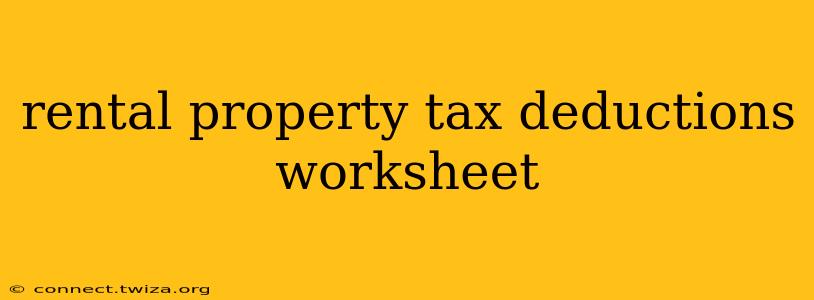Landlords and rental property owners often face a complex tax landscape. Understanding and maximizing allowable deductions is crucial for minimizing your tax burden and maximizing your profits. This comprehensive worksheet will guide you through the key deductions available for rental properties, helping you navigate the process with confidence.
What Rental Property Expenses Are Tax Deductible?
Many expenses associated with owning and managing a rental property are tax-deductible. These deductions can significantly reduce your taxable income. However, it's crucial to understand which expenses qualify and how to accurately report them. Deductible expenses generally fall under two broad categories: operating expenses and capital expenses.
Operating Expenses:
These are the ongoing costs of running your rental property. Examples include:
- Advertising: Costs associated with finding tenants (e.g., online ads, classified ads).
- Cleaning and maintenance: Regular cleaning, repairs, and maintenance to keep the property habitable.
- Insurance: Property insurance premiums.
- Mortgage interest: Interest paid on a mortgage used to purchase the rental property (subject to limitations).
- Property taxes: Taxes levied on the rental property.
- Repairs: Costs to fix damage or wear and tear (distinguish from improvements, discussed below).
- Supplies: Cleaning supplies, minor repair materials.
- Utilities: If you pay utilities on behalf of the tenant (check your lease agreement).
- Travel expenses: Travel expenses directly related to managing the property (e.g., inspecting the property, meeting with contractors).
- Vacancy losses: If the property was vacant for any period of the year.
Capital Expenses:
These are expenses related to improvements or upgrades that significantly enhance the value or lifespan of the property. They are generally not fully deductible in the year they are incurred but are depreciated over time. Examples include:
- Major renovations: Complete kitchen or bathroom remodels.
- Additions: Adding a new room or structure to the property.
- Roof replacement: Replacing a worn-out roof.
What Records Do I Need to Keep for Rental Property Tax Deductions?
Maintaining meticulous records is vital for claiming rental property tax deductions. The IRS requires substantial documentation to support your claims. Keep records of:
- Rental income: All rental payments received.
- Rental expenses: Detailed receipts, invoices, and canceled checks for all expenses.
- Mortgage statements: Showing the interest paid.
- Property tax statements: Showing the amount of taxes paid.
- Insurance policies: Showing premium payments.
- Depreciation schedule: A detailed record of your property's depreciation.
How Do I Calculate Depreciation for My Rental Property?
Depreciation allows you to deduct a portion of the cost of your rental property over its useful life. This is a significant deduction for rental property owners. You generally cannot depreciate the land itself, only the building and improvements. The most common depreciation method is the straight-line method, which spreads the cost evenly over the asset's useful life (typically 27.5 years for residential rental property).
What About Passive Activity Losses?
Passive activity losses (PALs) are losses from activities in which you don't materially participate. Rental real estate is generally considered a passive activity. There are limitations on how much of a passive activity loss you can deduct against other income. You can generally only deduct passive losses up to the amount of passive income you have.
What Forms Do I Need to File for Rental Income and Expenses?
You'll primarily use Schedule E (Supplemental Income and Loss) of Form 1040 to report your rental income and expenses.
What if I Have Questions About My Rental Property Tax Deductions?
If you have complex tax situations or are unsure about specific deductions, it's highly recommended to consult with a qualified tax professional. They can provide personalized guidance based on your specific circumstances.
This worksheet provides a general overview. Tax laws are complex and can change, so always refer to the most current IRS publications and seek professional advice when needed. Accurate record-keeping is key to successfully claiming all eligible deductions and avoiding potential audits.
